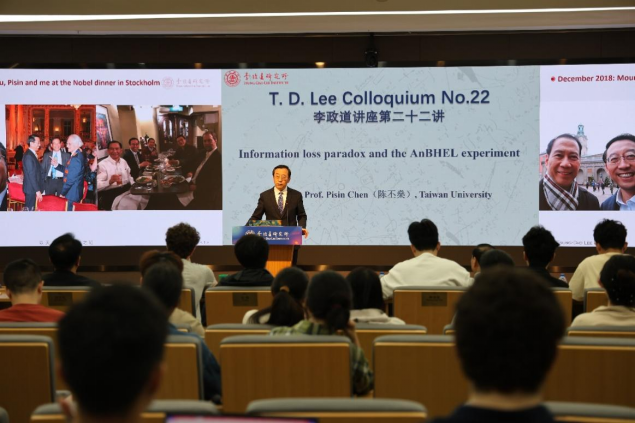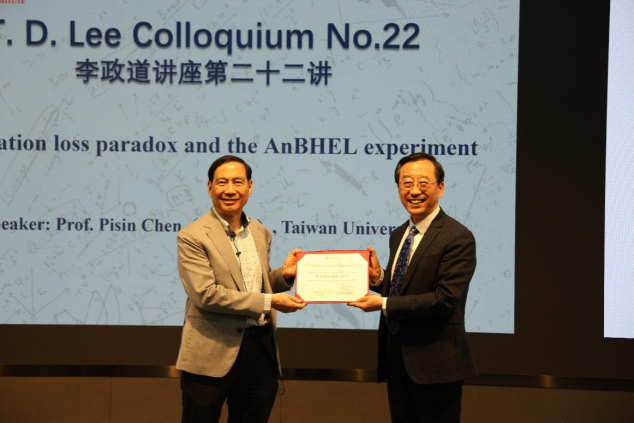
On the afternoon of April 24, Professor Pisin Chen from Taiwan University was invited to visit the Tsung-Tao Lee Institute and give the 22nd T. D. Lee Colloquium entitled “Information loss paradox and the AnaBHEL experiment”. Jie Zhang, CAS Academician and Director of TDLI, Xiaogang He, TDLI Chair Professor, Jianglai Liu, TDLI Distinguished Fellow, as well as more than 90 students, postdocs, faculty members attended the colloquium,. Through the live broadcast, it also attracted more than 2,100 visits from home and abroad. The presentation was hosted by Academician Jie Zhang.
In this presentation, Professor Pisin Chen introduced that based on the Euclidean path integral formalism, his team's research reveals the existence of quantum tunnelling effect during black hole evaporation, leading to superposition of different spacetime geometric paths and multi-history evolution. This discovery overturns the traditional assumption of a single evolutionary path and derives a modified black hole entanglement entropy Page curve - with its entropy turning point (Page time) moving towards the end point of black hole evaporation. This modified model shows that the entropy value at the late stage of black hole evaporation may break through the classical Bekenstein-Hawking entropy boundary, suggesting that information may escape through the quantum entanglement properties of radiation (e.g. the “quantum extremal surface” coding mechanism), which provides a key theoretical support for the conservation of information. Professor Chen also introduced that to break through the limitations of astronomical observations, the AnaBHEL experiment (Analog Black Hole Evaporation via Lasers) uses an ultra-intense laser pulses to drive a plasma mirror to simulate the dynamics near the field of horizon of a black hole, generating pairs of phonon radiation similar to Hawking's radiation and capturing its quantum entanglement properties. The simulation data of 2023 showed that the entropic trend of the radiation was in agreement with the prediction of the corrected Page curve, preliminary verifying that information may escape through entanglement.
During the Q&A session, the participants had a lively discussion on the theoretical breakthrough of the black hole information loss paradox and the design and progress of the AnaBHEL experiment. Professor Pisin Chen answered the audience's questions in detail and gave an outlook on the future research direction. He pointed out that the advancement of AnaBHEL experiment is expected to reveal the quantum mechanism of black hole information loss paradox for the first time at laboratory scale, providing empirical evidence for quantum gravity theory. If successful, it will confirm the way of information being preserved in Hawking radiation, ending the half-century-long “information loss” controversy. This research not only promotes the in-depth integration of general relativity and quantum mechanics, but also provides new ideas for quantum computing, high-density information storage and other cutting-edge fields through technological paths (such as high-energy laser and plasma manipulation). The synergistic exploration of theory and experiment marks a crucial step in the journey of human beings to understand the nature of space-time.

At the end of the lecture, Academician Jie Zhang, on behalf of the Institute, presented Professor Pisin Chen with a commemorative certificate and a customized cartoon portrait of Professor Chen to thank him for delivering a so wonderful colloquium to the students and faculty of the Institute.
Bio of Professor Pisin Chen
Professor Pisin Chen is the Chee-Chun Leung Distinguished Chair Professor of Cosmology at Taiwan University. He received his BS degree from NTU and PhD in theoretical particle physics from UCLA under Prof. J. J. Sakurai. He was a postdoc of Prof. John Dawson in 1984-1986. He then worked at SLAC National Accelerator Center from 1986 to 2007. In 2000, he initiated and successfully raised private endowment to establish the Pehong and Adele Chen Institute for Particle Astrophysics and Cosmology (later renamed the Kavli Institute for Particle Astrophysics and Cosmology) at Stanford University. He joined the faculty of his alma mater NTU in 2007, and again successfully raised private endowment to found the Leung Center for Cosmology and Particle Physics (LeCosPA) and served as its director since 2007 until the end of 2023. He is the LeCosPA Founding Director Emeritus since 2024. Professor Pisin Chen is internationally recognized as the inventor of the particle-beam-driven plasma wakefield accelerator (PWFA) concept in 1985. He is the Laureate of the 2018 Blaise Pascal Chair bestowed by the Government of Ile de France, the 2023 EPS-DPP Hannes Alfven Prize, and the 2024 AAPPS-DPP Subramanyan Chandrasekhar Prize.

